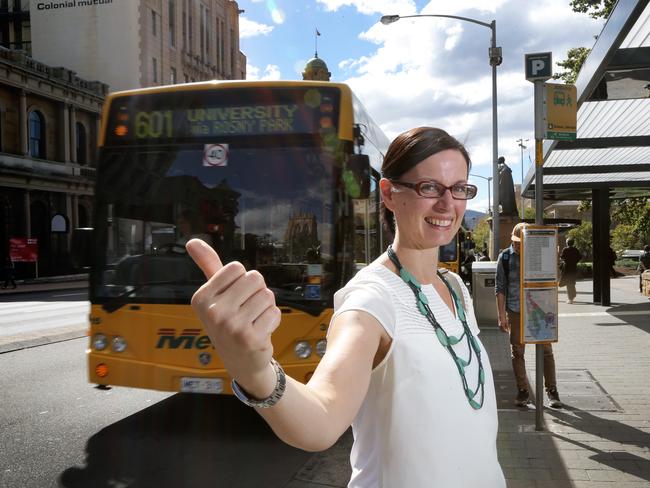Study looks at incentives for people to catch Metro buses
Tasmanians will be offered an incentive to use buses as part of a landmark study in public transport use.

Tasmania
Don't miss out on the headlines from Tasmania. Followed categories will be added to My News.
TASMANIANS will be offered an incentive to hop on a bus as part of a landmark study investigating ways of encouraging more people to use public transport.
The Menzies Institute for Medical Research has received a grant from the National Health and Medical Research Council to try to understand and promote public and active forms of transport.
The institute will partner with Metro Tasmania, the State Government and the Local Government Association of Tasmania to undertake the study.
Researcher Dr Verity Cleland said a key part of the study would be determining whether an incentive scheme would help Metro attract more passengers on to buses.
MORE NEWS:
STUDENTS CHALLENGED EVEN BEFORE CLASS STARTS
LIGHT RAIL CONSIDERED IN CITY DEAL
GIANT CRAYS FACE A GIANT PROBLEM
GALLERY: CLARENCE JAZZ FESTIVAL
CANCER CHARITY LOOKING FOR SHACKS FOR RETREATS
“The largest piece of work will be a trial to see whether an incentive-based program to promote bus use results in more physical activity and more bus use,” Dr Cleland said. The trial of incentives will take place later this year, and will see people rewarded when they meet targets for increased bus travel.
Researchers will then determine whether the extra bus travel increases people’s physical activity, because they walk to a bus stop.

“We hypothesise that using a bus more than a car will increase incidental activity,” Dr Cleland said.
The incentive idea has never been tested before, and the method of incentive is still being finalised.
Dr Cleland said determining whether a small incentive to catch buses resulted in “more bums on seats” would be useful information for Metro.
The upcoming research follows another, yet to be published, Menzies study into the travel habits of Tasmanians.
Dr Cleland, who was lead researcher in the recent study, said the survey of 1000 Tasmanians asked how they commuted from “A to B” - whether they went by car or some other means.
MORE CITY DEAL:
MORE THAN $90 MILLION TO BE UNVEILED TO BUST CONGESTION
HOBART CITY DEAL DELIVERS $30 MILLION TO BUILD 130 NEW HOUSES
FOCUS ON KEY ISSUES SECRET TO CITY DEAL SUCCESS, LAUNCESTON MAYOR SAYS
Of those surveyed, 62 per cent lived five or less minutes from a bus stop – yet only 18 per cent used the bus five times or more a week and 62 per cent did not take the bus at all.
Of those who did catch buses, only 13 per cent walked further than needed to or from a bus stop as a means of increasing activity levels.
The research also revealed there is no demographic difference in terms of who catches buses, with use split between gender, age, employment status, education level, health and disability.
When asked what would encourage them to catch more buses, respondents said they wanted to see: real-time travel information (showing when a bus would next arrive), bus-only lanes and employee incentives.
anne.mather@news.com.au


